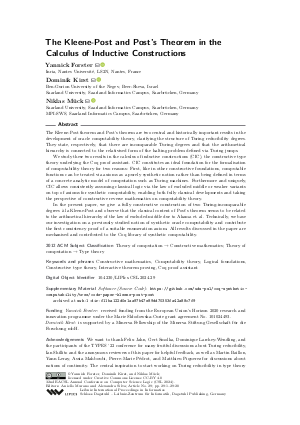LIPIcs.CSL.2024.29.pdf
- Filesize: 0.88 MB
- 20 pages

 Creative Commons Attribution 4.0 International license
Creative Commons Attribution 4.0 International license

The Kleene-Post theorem and Post’s theorem are two central and historically important results in the development of oracle computability theory, clarifying the structure of Turing reducibility degrees. They state, respectively, that there are incomparable Turing degrees and that the arithmetical hierarchy is connected to the relativised form of the halting problem defined via Turing jumps. We study these two results in the calculus of inductive constructions (CIC), the constructive type theory underlying the Coq proof assistant. CIC constitutes an ideal foundation for the formalisation of computability theory for two reasons: First, like in other constructive foundations, computable functions can be treated via axioms as a purely synthetic notion rather than being defined in terms of a concrete analytic model of computation such as Turing machines. Furthermore and uniquely, CIC allows consistently assuming classical logic via the law of excluded middle or weaker variants on top of axioms for synthetic computability, enabling both fully classical developments and taking the perspective of constructive reverse mathematics on computability theory. In the present paper, we give a fully constructive construction of two Turing-incomparable degrees à la Kleene-Post and observe that the classical content of Post’s theorem seems to be related to the arithmetical hierarchy of the law of excluded middle due to Akama et. al. Technically, we base our investigation on a previously studied notion of synthetic oracle computability and contribute the first consistency proof of a suitable enumeration axiom. All results discussed in the paper are mechanised and contributed to the Coq library of synthetic computability.






Feedback for Dagstuhl Publishing